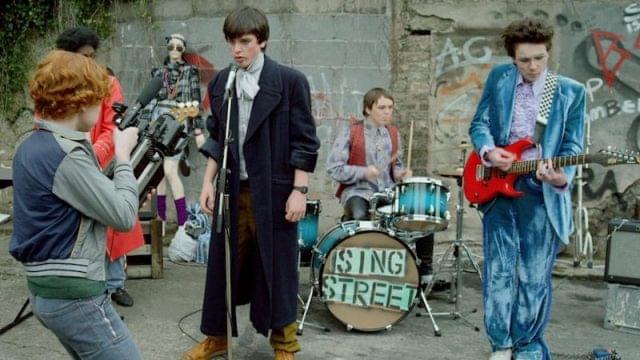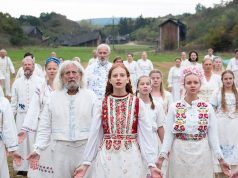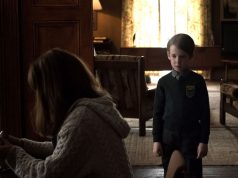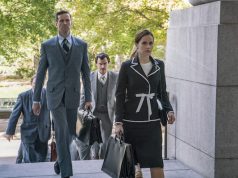
Boy meets girl; boy likes girl; boy starts band to impress girl. It’s a story as old as time, and “Sing Street” — an exuberant musical from “Once” writer-director John Carney — tells it gracefully, with warm humor and a touch of bittersweet nostalgia. Music makes life better, the movie says. And if it doesn’t, it at least makes life SEEM better, and maybe that’s good enough.
In Dublin in 1985 there is an apple-cheeked 15-year-old boy, Conor (Ferdia Walsh-Peelo), whose life is being disrupted. His parents (Aidan Gillen, Maria Doyle Kennedy) are on the verge of splitting up, and money problems have forced them to move Conor from a posh Jesuit school to the working-class Synge Street school (a real place) run by the Christian Brothers. Here Conor is hassled by a bully (Ian Kenny) and an officious priest (Don Wycherley) before being taken in by Darren (Ben Carolan), an entrepreneurial red-headed weakling who knows how to operate at the low end of the totem pole. (Darren passes out business cards that don’t have a phone number because his family doesn’t have a phone.)
At home, Conor dabbles on the guitar and eagerly watches “Top of the Pops” every week, absorbing his college-dropout brother Brendan’s (Jack Reynor) opinions on Duran Duran, Joe Jackson, and the like. This comes in handy when Conor notices Raphina (Lucy Boynton), a cool 16-year-old who lives in a girls’ home near the school and says she’s a model. Conor invites her to be in his band’s new music video. Then he tells Darren, “We need to form a band!”
In the time-honored tradition of movie musicals, Conor and Darren have no trouble assembling a group of classmates who can play instruments well enough to perform as a band, and the songs they write are catchy and literate. They call themselves Sing Street (get it?). What’s charming is that instead of being cool, the band members are all scrawny, early-adolescent dorks. One of them, Eamon (Mark McKenna), raises rabbits as a hobby; his mother, clad entirely in acid-washed denim, totters around the kitchen pouring tea for the boys as they plan their careers as rock stars. Another boy (Percy Chamburuka) is recruited only because he’s black, which Conor and Darren innocently assume means he knows music.
Their casual, culturally ingrained racism (which pops up only briefly) is a reflection of their naiveté, harmless in context. But it’s also a reminder that Dublin in 1985 is a dead-end backwater from which young people with any gumption want to escape. Brendan, Conor’s role model, used to strive for that, before his ambition was lost in a cloud of hashish. Raphina, who’s only a year older than Conor but seems so worldly and mature — which she isn’t, actually, but Conor doesn’t have the perspective to see that — talks about running off to London with her sort-of boyfriend, who’s older and has a car and everything.
Certain details of the plot are worked out too tidily and improbably (though it’s fair to mention that that’s often the case in this genre), and in the film’s attempt to be both a shiny musical and a kitchen-sink drama, some serious issues are glossed over. Carney makes it work by tapping into two potent forms of cinematic emotional weaponry: nostalgia and music. Seeing Conor walk into school each week with new hair, makeup, and clothes inspired by whichever band he has most recently discovered is universally relatable, regardless of which era you grew up in or whether you ever imitated a pop star yourself. Likewise, Conor and his bandmates’ blind zeal and childish ambition must put a smile on the face of anyone who was ever young with big dreams.
And the music? Perfect. Along with vintage tracks by The Cure, Duran Duran, and so forth are Sing Street’s original tunes (written by Carney and Gary Clark), all of them spot-on facsimiles of songs that boys like this would have written in 1985. The film’s high point is a rehearsal of a boppy follow-your-dreams anthem called “Drive It Like You Stole It,” during which Conor imagines the band performing at a 1950s American prom where his parents reunite, Brendan deals with Raphina’s abusive boyfriend, and the stuffy priest dazzles the crowd with his dance moves.
In that fantasy, Conor’s problems are easily solved (by music, no less), and we laugh wistfully at the simplicity of it all while secretly clinging to the hope that Conor is right. Kids make cheerful optimism seem so easy. The movie, with its sweet, honest performances and toe-tapping soundtrack, does the same.
A- (1 hr., 46 min.; )





